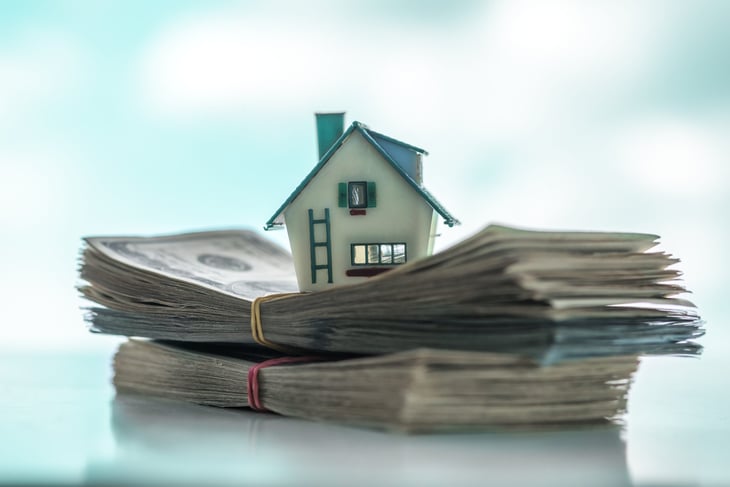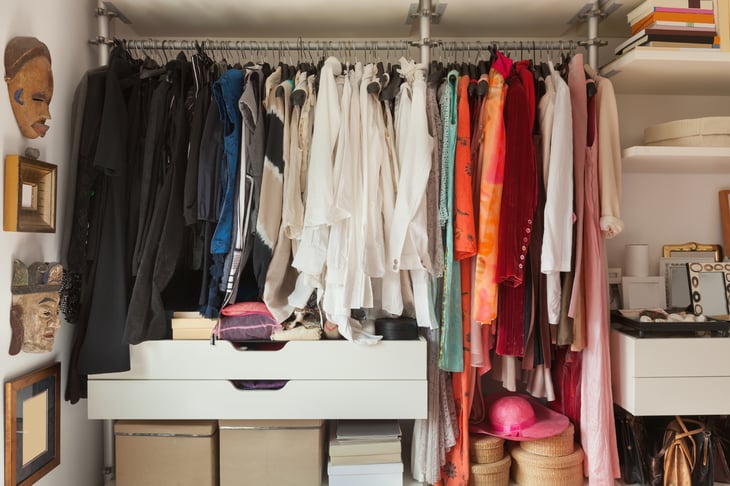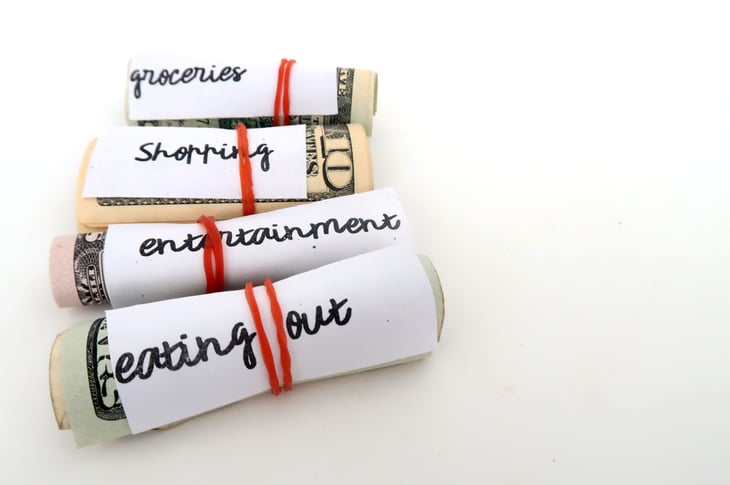
Editor's Note: This story originally appeared on Living on the Cheap.
Many experts will tell you that to get rich, you should live below your means. That is, spend less money than you earn. This advice holds true whether your income is $25,000, $50,000, $100,000, or $1 million a year. Sounds simple, right?
Of course, it is easier to live below your means if you earn $30,000 as a single person with no dependents than if you earn $80,000 and have a spouse and two children — one of whom is entering college next year.
But whether you are young and starting out, have a lot of responsibilities on your plate, or just received a hefty bonus or raise, it can be useful to examine your standard of living compared to your income level.
One truism about American life is that we are frequently told how we can be happier and more successful by spending money on things.
Through the internet, television, signs, magazines, and newspapers, we are bombarded with advertising messages that encourage us to spend money.
The truth is, people who overspend on material things tend to feel anxious and miserable, while people who live below their means tend to feel secure and happy. Of course they are. They figured out how to get rich slowly.
How do you know if you live above your means?

Obviously, if you routinely run out of money before the end of the month, you are living above your means. But there are other telltale signs you are spending more than you make:
- You don’t pay off your credit card balance every month. Every. Single. Month.
- You have no back-up living expenses. You don’t have at least three months’ living expenses in an interest-bearing savings account.
- You have no reserve fund. In addition to three months’ living expenses, you don’t have a reserve to pay for irregular but expected expenses such as a new winter coat, annual insurance premiums, or holiday expenditures.
- Your mortgage (or rent) is more than 25% of your take home pay. If so, too much of your income is devoted to housing costs.
- You have no savings plan in your budget. You don’t save a regular percentage of your pay.
- You spend a high percentage of your income on nonessentials. Only 20% of your take-home pay should be spent on extras. Extras include entertainment, dining out, home services, personal services, vacations, and any other nonessentials.
Trimming relatively small expenses such as lattes, magazines, and gym memberships is a common approach to reducing expenses. But to get rich, you need to learn how to live below your means. To do this, you need to examine your essential living expenses.
Essential living expenses

The biggest essential expenses most of us have are housing and transportation.
Most Americans living above their means do so because they spend too much on these two items. Other essentials include food, clothing, and health or medical expenses.
What follows are some suggestions for reducing all of these essential items.
Total housing expenses

Depending on whom you ask, experts recommend that total housing costs should require only 20% to 25% of your take-home pay or 28% to 33% of your gross pay.
Total housing costs include not only your mortgage or rent, but also utilities and homeowner’s or renter’s insurance. If you own your home, total housing expenses also include real estate taxes and an allowance for maintenance and repairs.
The homeowner’s maintenance and repair allowance needs to cover unexpected expenses, such as plumbing repairs for a broken pipe in winter, as well as expected costs to maintain your home.
Big ticket maintenance items include a new roof, on average about every 25 years, and repainting the house every five to 10 years. Other smaller expenses are replacing appliances as needed, plus any other house (and yard) maintenance costs.
A maintenance budget of at least 1% of the value of your home, set aside annually, is a reasonable estimate.
If you are thinking about buying your first home, pay close attention to these numbers.
Transportation costs

You can lower the cost of vehicle ownership by buying an economy model, buying a used car that is at least 2 years old, and keeping the car for at least six years (and preferably longer, eight years or more).
It is usually less expensive to maintain an old car than it is to buy a newer car. My used (and paid for) vehicle costs me about $2,800 a year to operate. I don’t plan to trade it in any time soon. It runs great, and I keep up on maintenance.
Some families reduce transportation costs by only owning one car. When they need a second or larger vehicle for a special need, they simply rent one. There are also less expensive transportation vehicles to consider, such as a motorized scooter.
Some cities have good public transportation that is much more economical than owning a car for routine trips such as getting to work. Still other cities and towns have walkable neighborhoods with good stores and services that reduce the need for routine car trips.
Your ability to get by with fewer or no cars or to use alternative or public transportation is often dictated by where you work and live. If you are considering a change to your housing situation, be sure to examine transportation options as well.
Cost of food

The more convenience products (packaged or prepared foods) you buy, the more you will spend on food. As much as possible, buy seasonal produce, seconds, foods in bulk or generic and store brands.
But be mindful of what you buy in bulk. Buy only what you can use. Five pounds of cheese or a gallon of marinara sauce that goes bad before you use it does not save you money. (Here are more tips for saving money on food.)
For packaged products you do buy (from applesauce to tomato sauce), clip coupons if you have a lot of time to devote to the practice.
Better yet, learn to cook from scratch. You really only need a few basic recipes for soup, stews, and stir-fries. Then just vary the ingredients seasonally or according to what you can buy cheaply in any given week.
But what about chips, sodas, snacks, and desserts? These nonessential items should not come out of your food budget; they should come out of your budget for extras.
Clothing expenses

There are a couple of approaches to saving money on essential clothes.
One is to buy high-quality garments that don’t go out of style (and don’t wear out). Buy them on sale, at discount stores or second-hand stores specializing in curated high-end labels.
Pay attention to cleaning labels. For garments that need to be dry cleaned, you will need to budget for that expense in order to get the most value from these clothes. But well-made, classic garments can last a lifetime.
Another approach is to buy essential pieces that are all mix and match, washable garments.
To extend the wearable life of washable clothes, don’t dry them in a dryer or don’t dry them completely. Instead, hang them until completely dry. (This also saves utility costs by running the dryer as little as possible.)
Consider a minimalist wardrobe

For either of these approaches, you might also consider building a minimalist wardrobe.
This is not some magic number of pieces, like 10 or 20. It’s about defining your style and your needs and then carefully buying only the garments that work for you 100% of the time.
For someone who works at home or lives where the climate is consistent all year long, 10 pieces might work, while someone in a corporate office with a professional dress code or where there are extreme seasonal climate changes might need a closet with 50 pieces.
The point is, you should only spend money on clothes you need and wear consistently. If you have a closet stuffed with clothes and nothing to wear because you succumb to trends and impulse buys, consider a revamp to a minimalist style.
Health and medical expenses

If you are generally healthy, then stay that way by eating a balanced diet, getting enough exercise and allocating some of your budget for services that will help you stay healthy.
These expenditures might include preventive health measures like a fitness class as well as a routine physical checkup with your physician from time to time based on your age and activities.
If you have health insurance, be sure to maximize your use of this benefit.
More tips for living below your means

These are some behaviors you need to adopt immediately in order to begin to live below your means:
- Create a budget using actual numbers (mortgage, rent, utilities, food, etc.) and stick to it.
- Eliminate debt. You can’t live below your means if you have debt. Especially do not take on debt for essential living expenses (other than a home mortgage). Ever. You are living above your means. If you have debt, pay it off. Once it’s paid off, vow never to take any debt on again.
- Do not use credit if you can’t afford to pay the credit card bill in full when it is due. If you don’t have the cash for something, you are living above your means.
- Avoid unnecessary fees such late fees, bank fees, bill-paying fees, check cashing fees, and ATM fees. Set up free auto-pay on your online banking accounts if you often forget to pay bills.
- Resist the trend to be upwardly mobile. When you get a raise, do not increase your standard of living. Over 1 million millionaires live in homes valued under $300,000, according to Thomas J. Stanley, author of “The Millionaire Next Door.”
- Track every penny you spend. Compare actual expenditures to your budget. If they don’t match, and expenses are over the budget, get to work. Negotiate fees or cancel services. Reduce expenses or get a second job, or both. You can find budgeting software and apps to help you track your expenses and keep you honest about not overspending.
- Think long term. Don’t spend today. Save for tomorrow.
Even more tips for living below your means

Finally, here are some additional tips for living below your means. Keep these in mind especially when you are tempted by commercial messages or the urge to find happiness by spending money:
- Be content. Don’t envy others. Don’t try to keep up. Be satisfied with what you have. Choose to be happy where you are.
- Don’t go window-shopping or look at online shopping sites. Read. Exercise. Call a friend. Visit with family. Review your budget. Clean.
- Act like you have no money. When tempted to spend impulsively, simply remind yourself you have no money.
- Pay special attention to impulsive behaviors such as tossing something extra into your shopping cart that’s not on your shopping list or splurging, whether it’s “just a latte” or an expensive piece of clothing you want.
- Instead of buying something, check whether it makes more sense to borrow it from a neighbor, rent the item or repurpose something you already have. See if it’s available on your local Buy Nothing or Freecycle group. Or just wait a day and rethink the purchase.
- Look for ways to grow your income. Ask for a raise. Get some training that will get you a better-paying job. Get a second job.
Start small

If all of this seems overwhelming, start small. Start by reducing expenses by one thing. Continue to reduce expenses by 10% every year until you are living small.
This means spending only half (50%) of your take home pay on essential living expenses. Put 30% in savings. And spend no more than 20% on extras.
Once you get there, stay small. If you receive a raise or bonus at work, save it and continue to live on the same budget.
Most people who get to this point find it gets easier and easier to not spend money. They prefer the sense of security and satisfaction that living below your means brings. They begin to realize, they are slowing getting rich.





Add a Comment
Our Policy: We welcome relevant and respectful comments in order to foster healthy and informative discussions. All other comments may be removed. Comments with links are automatically held for moderation.